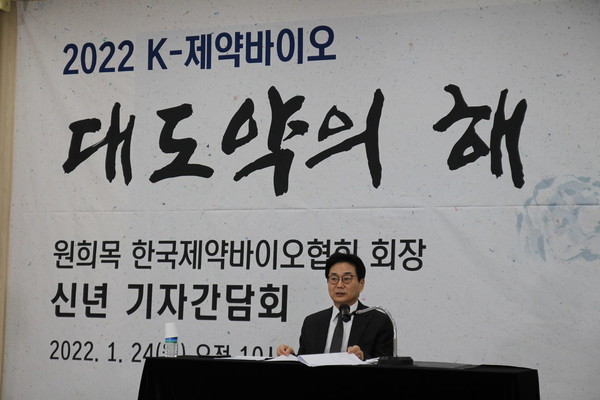“As policies, financial support, and regulations for pharmaceutical and biotech industry growth are dispersed across multiple government agencies, the efficiency has been lowered. And no entity manages the entire cycle of new drug development, from basic research to clinical trials and global expansion. To establish long-term strategies and coordinate policies of each ministry, we need a control tower under the direct control of the president.”
So said Won Hee-mok, chairman of the Korea Pharmaceutical and Bio-Pharma Manufacturers Association (KPBMA), at a news conference on Monday.

The association set 2022 as the year for Korean pharmaceutical and biotech companies to make a great leap forward.
At the news conference, KPBMA unveiled goals for this year and the industry’s demands for the government.
According to Won, four home-grown new drugs received marketing approval which was the highest in history.
He said that the nation’s pharmaceutical industry achieved over 13 trillion won technology transfer deals, and drug exports exceeded 10 trillion won last year.
Korean drugmakers are increasingly making inroads into foreign markets, he noted.
Won also said that the number of new drug pipelines increased 2.6 times from 573 in 2018 to 1,477 in 2021, adding, “We’re taking a very bold challenge.”
Still, the Korean pharmaceutical industry needs a new direction where companies expand their development spectrum from technology transfer to the final commercialization of new drugs, he said.
This year, KPBMA will establish a “Drug Discovery Library” consortium and launch the “Bio-health Specialized Technology Exchange” so that Korean companies can challenge new drug development.
The association also disclosed measures to support Korean companies’ entry into foreign markets and strengthen drug quality management.
“We plan to increase the number of participating companies at the Cambridge Innovation Center in Boston from four to 12,” Won said.
To do so, the association will sign a tripartite MOU with the Korean consulate in Boston and the Korea Health Industry Development Institute, he said.
Won emphasized that for the Korean pharmaceutical and biotech industry to make a “quantum jump” in growth, it needs not only a challenging spirit but the government’s bold investment.
He said the lack of government investment in applied research to support clinical trials was one of the problems in pharmaceutical policy.
As the government’s R&D investment was lopsided towards basic research, the support for applied research was extremely short in Korea, compared to advanced nations, Won said.
He added that the proportion of investment in applied research, which accounts for only 10 percent of the healthcare R&D projects, should increase to 30 or 40 percent.
To enable macro-level policy support for the pharmaceutical industry, he emphasized that the government needs to install a “Pharmaceutical Biotech Innovation Committee” directly under the presidential office.

